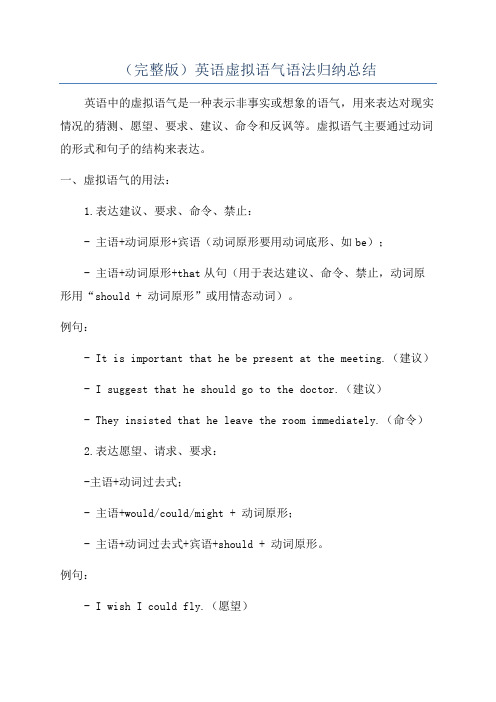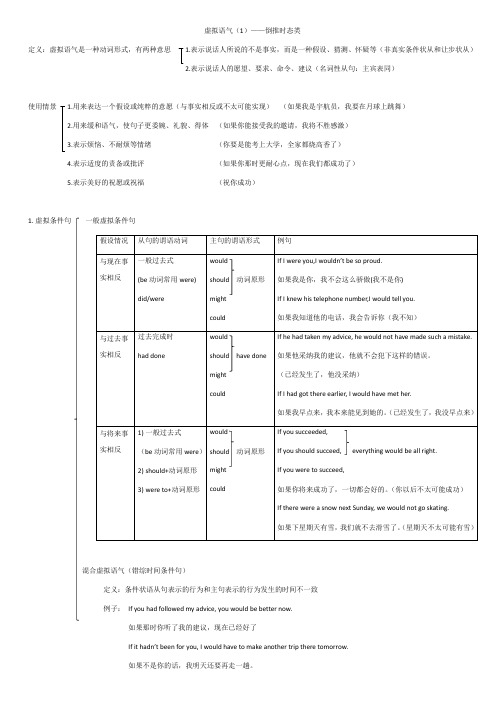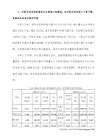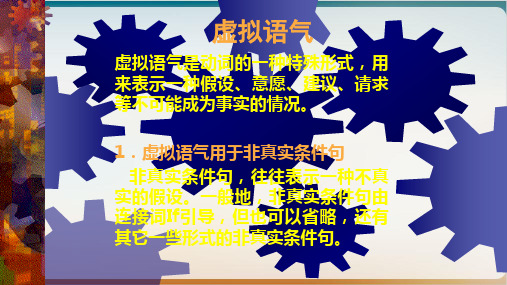虚拟语气讲解
(完整版)英语虚拟语气语法归纳总结

(完整版)英语虚拟语气语法归纳总结英语中的虚拟语气是一种表示非事实或想象的语气,用来表达对现实情况的猜测、愿望、要求、建议、命令和反讽等。
虚拟语气主要通过动词的形式和句子的结构来表达。
一、虚拟语气的用法:1.表达建议、要求、命令、禁止:- 主语+动词原形+宾语(动词原形要用动词底形、如be);- 主语+动词原形+that从句(用于表达建议、命令、禁止,动词原形用“should + 动词原形”或用情态动词)。
例句:- It is important that he be present at the meeting.(建议)- I suggest that he should go to the doctor.(建议)- They insisted that he leave the room immediately.(命令)2.表达愿望、请求、要求:-主语+动词过去式;- 主语+would/could/might + 动词原形;- 主语+动词过去式+宾语+should + 动词原形。
例句:- I wish I could fly.(愿望)- I would appreciate it if you could help me.(请求)3.表示虚拟条件:- If条件从句中的谓语动词用过去完成时,主句用would/should/might/could + have + 过去分词;- If条件从句中的谓语动词用过去时,主句用would/should/could + 动词原形。
例句:- If I had known his phone number, I would have called him.(虚拟条件)- If you had listened to me, we could have finished the project earlier.(虚拟条件)4.表达建议、要求、祝愿:- If only内部称述 + 主语 + 过去式。
虚拟语气总结

虚拟语气总结虚拟语气是指在表达某种假设、愿望、建议、要求、命令等语境下,表示与事实相反或不确定的情况。
它在语法上通常通过动词的形式、时态或其他语法手段来反映。
在本文中,我们将对虚拟语气进行总结和探讨。
一、虚拟语气形式1. 虚拟语气的主要形式有三种:过去时的虚拟、与过去事实相反的情况下的虚拟和对现在或将来的非事实情况的虚拟。
2. 过去时的虚拟:过去时的虚拟主要用于表示对现在或将来情况的否定假设。
常见的情况包括:与现在相反的假设、对未来的假设、对现在或过去的怀疑等。
例如:“如果我有足够的时间,我会去旅行。
”这里的“我有足够的时间”是一个假设情况。
3. 与过去事实相反的情况下的虚拟:与过去事实相反的情况下的虚拟主要用于表示不可能实现的愿望、建议、要求等。
例如:“要是我会弹吉他,我就能在演唱会上表演了。
”这里的“要是我会弹吉他”是与过去事实相反的假设情况。
4. 对现在或将来的非事实情况的虚拟:对现在或将来的非事实情况的虚拟主要用于表示对现实情况的否定、愿望或命令等。
例如:“如果我是你,我会好好珍惜机会。
”这里的“如果我是你”表示的是一个对现实情况的否定假设。
二、虚拟语气的用法1. 表示假设:虚拟语气常用于表达假设情况。
例如:“要是明天下雨,我们就不去野餐了。
”这里的“要是明天下雨”是条件状语从句,使用的是与现在或将来相反的虚拟语气。
2. 表示愿望:虚拟语气也经常用于表达愿望。
例如:“但愿我能赢得比赛。
”这里的“但愿我能赢得比赛”表示的是希望,但并不一定会实现。
3. 表示建议和要求:虚拟语气还可以用于表示建议和要求。
例如:“我建议你好好休息,不要工作太晚。
”这里的“我建议你好好休息”是对对方的建议。
4. 表示命令和禁止:虚拟语气也可用于表示命令和禁止。
例如:“要求学生们不要在教室里吃东西。
”这里的“不要在教室里吃东西”是对学生们的命令。
三、虚拟语气的注意事项1. 虚拟语气在使用时需遵循一定的语法规则,例如在条件状语从句中,谓语动词需使用过去式的形式。
(完整版)虚拟语气详解

虚拟语气详解虚拟语气表示说话人的主观愿望(往往与客观事实相反),或是表示假象和猜测。
虚拟语气无论从形式上还是时态上都比较复杂,需要归类记忆。
虚拟语气大体分为三类:(1) be型虚拟(2) were型虚拟(3) if 条件句及主句虚拟下面会详细说每种虚拟形式的特征和规律,考试时先判断属于哪种虚拟类型,剩下的皆是套路~(1)be型虚拟(基本是套路)形式:should + 动词原形,should可以省略用法:1)表示“命令、建议、要求”等意义词语之后的宾语从句用be型虚拟,常见的词如下: demand, desire, insist, order, ask, command, propose, recommend, suggest, prefer, require, request等最常见的形式是这类动词后面接着一个宾语从句,则宾语从句的谓语部分要用(should)+ 动词原形来虚拟例: We demand that the meeting(should)be postponed.The manager suggested that we (should) work together.注意:有时候你所见到不一定是上述动词引导的宾语从句,而是由上述词变体后所引导主语从句(it做形式主语,如:it is advised/ suggested/ requested/ ordered/ proposed that…)、表语从句或同位语从句例如:It is required that the students (should) learn a foreign language. (主语从句) The requirement is that all the equipment in the meeting room (should) be checked twice before. (表语从句)We didn’t stand for his proposal that the meeting (should)be postponed. (同位语从句)只要看到句中有上述动词或其变体,不管词性怎么变、句型怎么变,都用be型虚拟!特例:suggest和insist这两个比较特殊,当suggest作“暗示、表明、说明”讲,insist作“坚持说”讲,后面一般跟的是客观事实,不需要虚拟~这是一个比较重要的考点,体会下面两组句子:We all suggest that a lab (should) be built. 我们都建议建一个实验室。
高中英语之虚拟语气详细讲解

虚拟语气(1)——倒推时态类定义:虚拟语气是一种动词形式,有两种意思 1.表示说话人所说的不是事实,而是一种假设、猜测、怀疑等(非真实条件状从和让步状从)2.表示说话人的愿望、要求、命令、建议(名词性从句:主宾表同)使用情景 1.用来表达一个假设或纯粹的意愿(与事实相反或不太可能实现)(如果我是宇航员,我要在月球上跳舞)2.用来缓和语气,使句子更委婉、礼貌、得体(如果你能接受我的邀请,我将不胜感激)3.表示烦恼、不耐烦等情绪(你要是能考上大学,全家都烧高香了)4.表示适度的责备或批评(如果你那时更耐心点,现在我们都成功了)5.表示美好的祝愿或祝福(祝你成功)1.虚拟条件句一般虚拟条件句混合虚拟语气(错综时间条件句)定义:条件状语从句表示的行为和主句表示的行为发生的时间不一致例子:If you had followed my advice, you would be better now.如果那时你听了我的建议,现在已经好了If it hadn’t been for you, I would have to make another trip there tomorrow.如果不是你的话,我明天还要再走一趟。
If you had studied hard before,you would be a college student now.如果你以前努力学习的话,你现在就是大学生了。
省略+倒装当虚拟条件句的谓语动词中含有were,should,had时,if可以省略,并将were,should,had提前于句首,变为倒装句。
如果虚拟条件句是否定句,not 保留在原处If he should agree to go there, we should send him there.= Should he agree to go there,we should send him there.If she were there,she would agree with us.= Were she were, she would agree with us.If he had learnt about computers,we would have hired him.= Had he learnt about computers,we would have hired him.含蓄虚拟条件句定义:有时为了表达的需要,在虚拟语气中并不总是出现if引导的条件状语从句,而是通过其他手段来代替条件从句分类:1) but for....=(If it+be not for) ;without;Without your help ,we couldn’t have finished the work ahead of time.= But for your help,we couldn’t have finished the work ahead of time.= If it hadn’t been for your help,we couldn’t have finished the work ahead of time.没有你的帮助,我们不可能完成任务。
高考英语二轮专题语法系列--虚拟语气讲义

虚拟语气虚拟语气表示说话人的主观愿望、猜测、建议或与事实不符的假设等,也可以表示可能性较小的情况或不可能发生的情况,而不是客观存在的事实(表示客观事实要用陈述语气)。
虚拟语气是由句中谓语动词的特殊形式表现出来的。
虚拟语气常用于复合句中,也可用于简单句。
比较:If she asks me tomorrow,I shall do it.如果她明天请求我,我会做的。
(陈述语气,说话人认为请求的可能性大)If she asked me tomorrow, I should do it. 假如她明天请求我,我会做的。
(虚拟语气,说话人认为请求的可能性小或不可能请求)1 虚拟语气的用法1-1 虚拟语气用于条件状语从句中1)表示与现在事实相反的情况If I were/was not busy today, I should go with you.如果我今天有空,我会同你一起去的。
If he were/was here,he might talk with you.如果他在这里,他可能会同你谈谈。
If I were you,I wouldn't accept her suggestion.如果我是你,我不会接受她的建议。
If I knew the answer to the question,I should/ would tell you.如果我知道问题的答案,我当然会告诉你。
If we left now, we should/would arrive there in time.如果我们现在就动身,我们会准时到达那里。
If he didn't do exercise every day,he wouldn't be so strong.如果他不每天锻炼,他不会那样强壮的。
If it weren't raining, we would go fishing.要是现在不下雨,我们就去钓鱼了。
高中必备知识点解析虚拟语气的形式与用法

高中必备知识点解析虚拟语气的形式与用法虚拟语气是高中英语必备的语法知识点之一。
它在英语中经常被用于表达假设、愿望、建议、命令和推测等情态,通过使用虚拟语气,可以使语言更加丰富和准确。
本文将深入解析虚拟语气的形式与用法。
一、虚拟语气的形式1. 虚拟语气的一般现在时:用于表示与现在事实相反的情况。
其结构为:主语+动词原形(倒装)。
例如:If I were you, I would study harder.(如果我是你,我会更加努力学习。
)2. 虚拟语气的一般过去时:用于表示与过去事实相反的情况。
其结构为:主语+动词过去式(倒装)。
例如:If I had seen her yesterday, I would have said hello.(如果我昨天见到她,我会问好的。
)3. 虚拟语气的过去完成时:用于表示对过去情况的猜测或不可能发生的情况。
其结构为:主语+动词过去完成式(倒装)。
例如:I wish I had studied harder for the exam.(我希望我为考试努力学习。
)二、虚拟语气的用法1. 表达假设与条件:If I were you, I would travel around the world.(如果我是你,我会环游世界。
)I wish I had a million dollars.(我希望我有一百万美元。
)2. 表达愿望与建议:I wish you would stop smoking.(我希望你戒烟。
)It's important that she arrive on time.(她按时到达很重要。
)3. 表达命令与要求:The teacher ordered that the students be quiet.(老师要求学生们保持安静。
)She insisted that he leave immediately.(她坚持要他立刻离开。
)4. 表达推测与猜测:He looks as if he were sick.(他看起来像是生病了。
虚拟语气讲解!(很详细)

We must respect him no matter what / whatever mistakes he may have made. 不管他翻过什么错误,我们必须尊敬他。
(3) 在though, although等引导的让步状语从句中,从句虚拟语气结构为 should +动词原形,主句结构不限。如:
一、 条件句中的虚拟语气
1. 条件句中虚拟语气的形式
从句中提出一种与客观现实不相符或根本不可能存在的条件,主句会产生的一种不可能获得的结果。条件句中的虚拟语气根据不同的时间有三种不同的形式。
时间 ห้องสมุดไป่ตู้
从句谓语形式
主句谓语形式
将来
动词过去式(be用were)
① should + 原形动词(指现在或将来)。如:
He was angry that you should call him by name. 他很生气,你竟然对他直呼其名。
I was astonished that he should not answer such an easy question. 我很惊讶他竟答不出如此简单的问题。
If I were you, I would try my best to grasp the chance. 要是我是你的话,我要尽力抓住这次机会。
(2) 有时,虚拟条件句中,主、从句的动作若不是同时发生时,须区别对待。
①从句的动作与过去事实相反,而主句的动作与现在或现在正在发生的事实不符。如:
(3) 当虚拟条件句的谓语动词含有were, should, had时,if可省略,而将were, should, had等词置于句首。如:
Should he agree to go there, we would send him there. 要是他答应去的话,我们就派他去。
高中英语语法讲解——虚拟语气

2.这类主语从句常常用于表示要求、建议、 命令、请求、提议等,其谓语形式往往为 “ ( should)+ 动 词 原 形 ” 的 形 式 。 在 美 国,常省略should,而在英国,则往往不 省略should。
比如:
--It is necessary that the machine (should) be oiled everyday. 机器必须天天上油。
1.1.1.和现在事实相反的非真实条件句
这类非真实条件句表示和现在事实相反的情况。比如: --I would/should certainly go if I had the time.
如果我有时间,我一定会去的。 --If I were your father, I would criticize you more
--I never expected that the problem should be so complicated.
我从未想到问题会如此复杂。
--They just couldn’t believe that the new stadium should be so big.
他们简直不能相信新的体育馆会如此大。
--The teacher insisted that all the students (should) be on time.
老师要求学生们准时到校。
--He suggested that the regulations (should) be revised. 他建议修改规则。
The lawyer asked that the case (should ) be postponed for one month. 律师要求案子往后推迟一个月。
- 1、下载文档前请自行甄别文档内容的完整性,平台不提供额外的编辑、内容补充、找答案等附加服务。
- 2、"仅部分预览"的文档,不可在线预览部分如存在完整性等问题,可反馈申请退款(可完整预览的文档不适用该条件!)。
- 3、如文档侵犯您的权益,请联系客服反馈,我们会尽快为您处理(人工客服工作时间:9:00-18:30)。
I wish (that) I were a bird. I wish (that) I had seen the film last night. I wish (that) I would\could go tomor类词后面的宾语从句。 insist, order, command, suggest, advise, propose, require, request, demand, desire etc. We suggested that the meeting (should) be put off. They insisted that the boy (should) go with them. 注意:suggest 当表示“暗示、表明“讲时,insist 表示”坚持认为“之意时,应用陈述语气。 The smile on his face suggested that he was satisfied with
一种假设、猜测、怀疑等(用在条件从句中或让步 状语从句中);
一是表示说话人的愿望、要求、命令、建议等 (用
在宾语从句、表语从句、同位语从句)。
虚拟语气在简单句中的用法:
虚拟语气用语简单句中时,一般表示祝愿、命令等, 谓语动词要用动词原形。例如: Long live the People’s Republic of China! 中华人民共和国万岁! May you succeed! 祝你成功! (may用于旬首表示祝愿) May you be happy at your life! 祝你终生幸福!
虚拟语气在其他从句中
1. It is (high / about ) time that…从句中的谓 语动词用过去式或should+动词原形,should 不能省略.
It is high time that you went / should go to school. 2. If only 引导的感叹句(要是...该有多好啊) 表示现在的情况,应用过去式; 如果是过去的情况, 应用过去完成时态 If only I knew the answer! If only I had seen the film yesterday!
3. 重要的是我们要照顾好病人。 It’s important that we should take good care of the patient.
B. 在It is demanded/suggested/ordered/required… that-clause句型中从句用(should )+动词原型 It is demanded that we should work out a plan. C. 在 It is a pity/a shame/ no wonder that…..句型中从 句也常用(should )+动词原型 It’s a pity that you (should) miss a good chance.
与过去的事实相反: If you had worked hard, you wouldn’t have failed the exam.
If you had come yesterday, you would have met him.
与将来的事实相反: If it rained tomorrow,our picnic would be put off. If you came tomorrow,we would have the-'meeting.
5. If my father(be)_____ at home, I could not watch TV.
1.were, would be 2.would come 3.were
4.might 5.were
虚拟语气在名词从句中的运用 (1)用于宾语从句 1.wish 后面的宾语从句中。 一般用虚拟语气,表示一种不可能实现的愿望。其谓 语动词形式为: 表现在 表过去 表将来 过去时 过去完成时 would, might, could+动词原形
(3)虚拟语气在主语从句中
A.在句型 “It is important (necessary, strange, natural) that .... ” 中,that 后面的从句中的谓语动词用: should + 动词原 形
1. 我们有必要出去散散步。 It’s necessary that we should have a walk now. 2. 她这样做是很自然的。 It’s natural that she should do so.
My idea is that we (should ) think it over before accepting it. My suggestion that we (should) have a meeting has been accepted by others. We all agree to that suggestion that the meeting (should) be put off.
语气
语气——表示说话人对说话内容的看法的一种语法 范畴在英语中,可用不同的动词形式表示说话的语气。 动词的三种语气 : 陈述语气,祈使语气和虚拟语气。不同的语气用 动词的不同形式(有的还借助句法形式)来表示。
陈述语气——所表达的动作或状态是符合 客现实的。
Flowers blossom in the spring.
3. would rather + 从句
动词用过去式或过去完成时
I would rather you told me the truth. I would rather you had gone there last Sunday. 4. as if ( as though) 看起来 常用虚拟形式,即 表示与现在事实相反,用过去式;与过去事实相反 用过去完成式 (had done). He treats /treated the boy as if he were his own son. He speaks/ spoke as if he had known about it
2.省略句
在条件句中,可省略 if,把were ,had, should 提到 句首,变为倒装句式. If I were at school again, I would study harder. Were I at school again, I would study harder. If you had come earlier, you would have met him. Had you come earlier, you would have met him. If it should rain tomorrow, we would not go climbing. Should it rain tomorrow, we would not go climbing.
虚拟语气在条件条件句中的用法
虚拟语气条件句是谓语动词的特殊形式来表示与现 在、过去事实相反的情况或对将来发生的情况表示怀 疑。虚拟语气条件句所用的谓语动词的过去时、过去 完成时、过去将来时等只表示不同的虚拟语气,与陈 述语气的过去时、过去完成时等没有关系。具体情况 如下:
与现在的事实相反: If I had more time, I should study Japanese. If I were you, I should stay at home.
5. even if ( even though)即使
Even if he were here, he could not solve the problem.
Even if I had been busy then, I would have
helped you.
四. 情态动词+ have done could have done 本来可以… might have done 本来可能 … should / ought to have done 本来应该做 … shouldn’t / ought not to have done 本不该做 …
用所给词的正确形式填空:
1. If I ____ (be) ten years younger, I ____ (will be )very happy.
2. If I had time, I _____(come) to take part in your party. 3. Even if the teacher ____(be) here, he couldn’t solve the problem. 4. If he had a permit, he ____(may) get a job.
If+主语+动词过去式 If+主语+were to+ 动原 If+主语+should +动原
主语+should, would might, could+动原
If I had time, I would attend the meeting. If he had hurried, he could have caught the train. If I were to go abroad, I would go to America. More practice: 1.如果我是你,我就会努力学习. If I were you, I would work harder at my lessons. 2.如果我知道他的电话号码,我就给他打电话了. If I had known his telephone number, I would have called him. 3.如果明天下雨的话,我们会取消比赛. If it should \were to rain tomorrow, we would call off the match.
